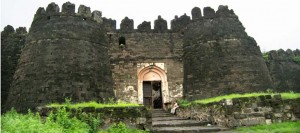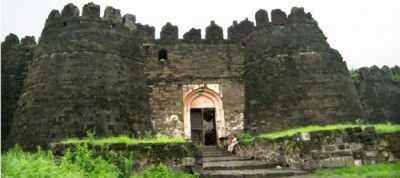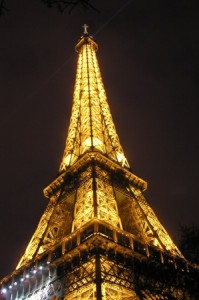by Saranyan BV
Recently, I visited the Ajanta and Ellora caves near Aurangabad in Maharastra. A small de-tour took me to the magnificent Daulatabad fort, hurdled by a demanding gradient to the top.
The fort wore a weary look, but wasn’t abandoned entirely; the archeological department’s little office was at the base. Before I embarked upon the journey, I had updated my knowledge of history from the website of Maharastra tourism.
The city of Devagiri was founded in 1187 by the Yadava king Bhilian V, with the fort constructed later during the reign of Singhana II (1210-46). It was captured by Ala-ud-Din Kalji in 1294, marking the first Muslim invasion of the Deccan. Muhammed-bin-Tughluq sought to make this city the capital, literally, forcibly transferring the entire population of Delhi and changing the name from Devagiri to Daulatabad. It is legend that our own Don Quixote later shifted the capital back to Delhi – lock, stock and barrel.
Reaching the Fort, I had second thoughts about scaling it, for it was too steep and too desolate. There were a handful of visitors, mostly families from nearby villages. The older Marathi men wore their typical white head gear, the women wore their sari wound through the legs. In contrast, there was a fair, aristocratic-looking family of five were there, speaking Telugu. They looked as if they belonged to the erstwhile Nizam, despite the flagrant poverty exhibited through their attire. Also there was a lady from Denmark, walking around with her DSLR, accompanied by a tourist guide who spoke broken English. I was not sure if the lady spoke English either, but the two seemed to be getting along fine.
 We arrived at the foot of the fort where something resembled a huge door, painstakingly carved. It even had a padlock. I learnt that it wasn’t a door at all, it was a false-structure embedded on the rock-solid walls to look like a door. The simple decoy was purported to mislead the enemies who would tire themselves out in an effort to break-open the darwazah. The defenders, by then, would organize the counter-attack from the real door at the flank, where the passage was narrow, barely able to allowing two cavaliers to ride side by side.
We arrived at the foot of the fort where something resembled a huge door, painstakingly carved. It even had a padlock. I learnt that it wasn’t a door at all, it was a false-structure embedded on the rock-solid walls to look like a door. The simple decoy was purported to mislead the enemies who would tire themselves out in an effort to break-open the darwazah. The defenders, by then, would organize the counter-attack from the real door at the flank, where the passage was narrow, barely able to allowing two cavaliers to ride side by side.
Further up, a giant rock soared rose steep, high and instantly. A moat went around, making it impossible for one to go forward, except through the cavernous hole carved on the granite rock. The guide said that the hole was the original passage conceived by the architects of the fort, but long since disused.
The guide explained that the path multiplied into several chutes after some distance, forming an intricate, dark maze, all of them ending blind except for one. The invading army, the guide informed, killed each other in the pandemonium and darkness created by the trap. The defenders didn’t really have to make an effort.
A creaky modern bridge was in place to take the tourists inside circumventing the original path. The bridge hung precariously across the moat which had neither crocodiles nor water, but filled with boulders gawky enough to the break bones.
The complacency of city-life gave vent to the prospect of exploration and adventure. I waived the bridge with contempt, cast aside the guide’s warnings about how dark the path would be, took a deep breath and slithered into the hole to explore the maze. Inside, I was carried back to historical times. I imagined that I was the General leading Kiljee’s army, all set to conquer the citadel.
I was certain that my instincts would never let me down, but the passage soon proved tricky, turning dark quickly as it meandered. Then the paths started diverging to the left, to the right, some climbed up, a few trails plummeted down. Every path I took reached a blind end. I was not sure if I returned to where I had started. The more I tried, the more I was baffled. After sometime I was sure I had lost my way completely. No trace of light anywhere. In some places the floor was wet, the little puddles making it difficult for me to crawl through. I tried flashing some light by fiddling with the touch-screen of my cell-phone. It was of no use. The network strength was feeble, almost dead.
I panicked.
I tried guessing the way back, by feeling the direction of wind, but the air was still except for the fanning from bat wings. Bats flew  over my head and shoulders at regular intervals. They never touched me even once – they had no problem in detecting obstructions in their flight-path. The bats were fidgety, erratic and in the abysmal darkness, appeared to take sharp curves. Trying to gauge the direction with the bats’ flight paths was useless; how would I know if they were coming in or going out or trying to settle in their nook for the night-cap?
over my head and shoulders at regular intervals. They never touched me even once – they had no problem in detecting obstructions in their flight-path. The bats were fidgety, erratic and in the abysmal darkness, appeared to take sharp curves. Trying to gauge the direction with the bats’ flight paths was useless; how would I know if they were coming in or going out or trying to settle in their nook for the night-cap?
It was time to leave everything to God. Questions jumbled. Would the guide be able to get me out? Or would he have found another tourist, more affluent than me? What if a robber comes, disengages me of cash, the camera and worse, the credit cards? What if a restless soul of someone slain during Thughlaq’s times, rises from the dead and takes revenge? I lied down feeling the wall with my palms, it was impossible to squat or crouch anymore. The wall was coarse, cold like a reptile’s skin. I didn’t know how long I waited miserably, hating the smell of bat and bat-shit, panting in desperation. The hot breath bruised my cheeks every time I sighed. I lost count of time.
Have you watched the mango-moth coming off from mango seeds? The wings flutter with joy of freedom after getting out of the birth-trap. Every man is a traveler lying dormant, until there is an opportunity.
But why do we reckon travel as a physical event?
Don’t we travel faster in our minds, feasting on the fodder of premonitions? Does our mind not fatten like a banana fish in our excitement? I love the short story, “A perfect day for Banana Fish” by JD Salinger. Maybe like the banana fish I have become too big for this hole. The weight of my body increased with each premonition, the ribs pressing deeply against my heart. I kept opening and closing my mouth, thinking this act would shrink me, make me lissome like a millipede, or like a snake. It seems a snake knows its direction using the scales under their belly. Snake… Emily Dickenson’s poem flashed like a lightening on a new moon night.
‘A narrow fellow in the grass
Occasionally rides..’
‘But never met this fellow
Attended or alone
Without a tighter breathing
And zero at the bone’
I prayed that there should be no snakes in that crevice. And even if there are, not the poisonous ones, not the cobra. Why was I preoccupied with only the reclusive authors during this dark hour? Emily seldom went outside her room, but she discovered in her own mind and spirit, in the tangible places which she visited often, the intensely private dominion referred to as the ‘undiscovered continent’ and ‘landscape of the spirit. My mind started doing rapids in the chasm of fantasy.
Somebody slapped my back – the sting was sharp, the hand dragged me, almost pulling my pants down. I hate showing my butt cleavage, I thought, tapping the hand off. A male voice asked me to follow him as he crawled backwards. Every consonant from his larynx seemed to say,‘ I told you so, I told you so’.
I followed him carefully, my limbs aching. It seemed to take long.
In the beginning there was God, then there was light. In the light I saw a vicious grin under the thick growth of beard.
It was Abdul, my guide. He had a sweet smile, the smile was God.
Saranyan BV is a Mumbai-based writer who came into the realm of literature by mistake but loves dwelling here. His poems and short stories have been published in many magazines in India and abroad.






